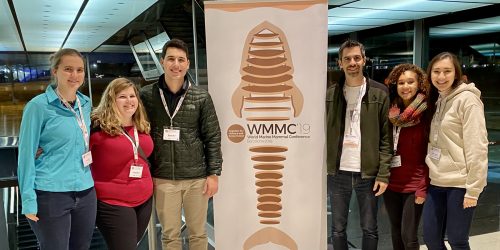
(L–R) Mindy McLarty, graduate student alumni; Amanda Moore, graduate student; Adam Weir; Daniel Gonzalez-Socoloske; Nina Woodard; Juliane Johnson
Courtesy Daniel Gonzalez-Socoloske
At Andrews University, students frequently participate in research laboratories to enrich their educational experience and prepare for future careers. The GonzalezSocoloske Conservation and Ecology Lab, through the Department of Biology, was created in 2013 and focuses on behavioral ecology and conservation.
Daniel Gonzalez-Socoloske, associate professor of Biology and lab director, says, “We look at various species at the organismal level that are endangered, and we try to look at aspects of their biology to garner information for developing better conservation strategies.”
The lab typically consists of undergraduate juniors and seniors. In fall 2019, there were four undergraduate and two master’s student researchers, the largest the lab has been to date.
Gonzalez introduces the student researchers to theoretical backgrounds and helps them define their projects. He often pitches potential research ideas to students based on projects he is currently working on or has worked on in the past. “Students have been involved in an array of different studies — from habitat studies to the ecology and behavior of the endangered species,” he says.
Most students work on their projects independently and meet once a week to present their progress to Gonzalez. “It’s not cookie cutter,” he says. “The student really has to take ownership of that project and carry it through, of course with my guidance and assistance. But the project will live or die with their commitment to it.”
Adam Weir, Nina Woodard and Juliane Johnson are undergraduate seniors and J.N. Andrews Honors students. Adam joined the lab his sophomore year, while Nina and Juliane joined the lab their junior year. Each studies a different aspect of manatee ecology. Adam’s research focuses on data he collected with Gonzalez from 17 manatees in Yucatan, Mexico; Nina studies the dental wear patterns of manatees; and Juliane researches the body size and structural differences between Florida manatees and Antillean manatees.
In December 2019, Adam, Nina and Juliane, along with Mindy McLarty and Amanda Moore (two graduate students from the lab), presented their research at the World Marine Mammal Conference in Barcelona, Spain. Approximately 2,500 scientists attend this biennial conference. “It’s a great opportunity for students to mingle with other students and meet other professionals. It’s where you get to meet all the people you’ve been reading papers about,” Gonzalez says.
Adam, Nina and Juliane each presented their research in “speed talks” — four minutes of speaking and one minute for questions. “It’s quite prestigious to present at these meetings, especially to get an oral presentation,” Gonzalez says.
Presenting at the Conference was just one valuable experience for students in the Gonzalez-Socoloske Conservation and Ecology Lab. “The skillset that they learn — doing research, thinking critically, writing and defending their thesis, presenting at a professional meeting with peers not affiliated with Andrews, is vital experience for them for whatever field they go into,” Gonzalez says.
“I’m thrilled to be a part of this lab, as it’s been a major highlight of my undergraduate career,” says Juliane. “It’s allowed me to combine both my Biology and Mathematics majors into one project and shown me how to be a professional researcher. I’ve gotten to present my project all over the world, which has been invaluable and prepared me to interact with other researchers around the globe.”
Moriah McDonald and Hannah Gallant, University Communication student writers, Andrews University.